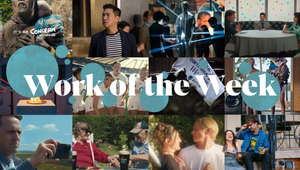
To Master Agentic AI, Learn from Drug Smugglers?

Artificial intelligence agents are already influencing how people discover, access, and interact with brands, breaking open the rules of brand building. So what does advertising look like when machines – not just people – become your audience, gatekeeper, and creative collaborator? That’s what the panel of experts gathered to discuss on the LBB & Friends Beach, moderated by LBB’s managing editor, EMEA, Alex Reeves.
Antonis Kocheilas, global chief transformation officer, Ogilvy, told those in attendance that he’ll be looking to drug smugglers on how to best approach AI agents, noting that it’s a “risky comment” – and clearly a humorous one.
“The best analogy I’ve found is that agents are like sniffer dogs used by police to detect drugs. Think about it – a sniffer dog is task-oriented, autonomous, highly intelligent, and equipped with an olfactory system far superior to that of humans. People rely on these dogs to accomplish something they can't do on their own,” Antonis said.
He added that “just as skilled smugglers can outsmart both the officer and the dog, we now face a dual challenge: managing both agents and humans simultaneously. If we don't learn to address this dual paradigm, with ‘brand out’ and ‘consumer in, we’re going to face serious problems. Do we know how to handle this yet? No. But fortunately, aside from me, there are very smart people actively thinking about it and experimenting. It’s the only path forward.”
In essence, Antonis is pointing towards the advertising industry’s continued need to evolve and learn how to market to AI agents – like they do with algorithms via SEO – alongside humans in the age of rapidly evolving AI, with agentic being its next iteration.
Tessa Conrad, head of innovation at TBWA\Worldwide, said she sees agentic AI through two main lenses, echoing Antonis’ comments, “brand out and consumer first”. For Tessa, “agentic AI has a strong foundation in utility. It allows us to create something that’s both experiential and genuinely useful, rather than just something to be looked at for branding purposes.”
At the moment, the technology is fairly straightforward and much like the chatbots we’re all already familiar with, though Tessa added, “We expect that to change dramatically over time.”
Tessa’s interest is in the consumer-facing side of agentic AI and her own work is revealing the challenge that marketers will face very soon. “I’m currently working on a system that replicates the decisions I’d make so I don’t have to interact with brands at all. That obviously complicates advertising and creative work in some ways, but it also makes it more exciting.” Why? Because “now, it’s not just about being useful, you also have to be meaningful, quirky, and engaging. And I think that’s where the truly human side of creativity shines,” she added.
To conclude, Tessa impressed on her fellow panellists and those in attendance to not turn to AI solely for efficiency as this would wholly underutilise the tech’s scope and potential.

“Relying on it for [efficiency] alone can quickly become a race to the bottom when it comes to brand value and differentiation. Find at least one experiment where you lean into the serendipity of creativity; that spark of joy, that unexpected insight. Something that feels truly different and teaches you something other companies haven’t figured out yet. That’s what will really set you up for the future,” she said.
Antonis sees the future of advertising and AI evolve along two axes, “cognitive intelligence, which we’ll have in abundance thanks to AI, and contextual imagination, a uniquely human skill. If we can combine these two, we’ll break down the silos and barriers that fragment our work and unlock new levels of creativity, leading to better outcomes.
“Cognitive intelligence is straightforward, it’s what algorithms and models are built for. Contextual imagination, on the other hand, is the ability to connect seemingly unrelated fields or domains of expertise to create something unique, not just for our agents, but for our customers. I believe we need to start thinking this way,” Antonis summarised, calling for the industry to not diverge along the two paths but combine them holistically.
“I think a good place to start is by identifying the top five business problems or challenges. That alone is a big step, technically. But it doesn’t need to be overwhelming, it’s okay to start simple. Even small efforts can deliver quick wins,” said Debora den Iseger, SVP, head of content and innovation, Global Studios, Monks.
She advised to look at the current bottlenecks and begin there. “Build from the bottom up, and create proof points. Track the return on investment, see what’s working, and reinvest those gains into a larger build. This bottom-up approach should also take change management into account. Everyone is on their own journey when it comes to understanding what AI can do, how we interact with it, and how we either enable or restrict its use. Being mindful of those dynamics from the start is probably the smartest way forward,” Debora added.
Caitlin Ryan, creative partner, Dentsu Creative, said that staying open and curious is the most important mindset right now. She also wisely cautioned “of anyone who’s either overselling or underselling what AI can do” because everyone “has skin in the game and is pitching different types of solutions”.
There’s no need to sprint ahead on the agentic AI journey, per Caitlin. “I truly believe we’re building the plane while flying it. So not rushing to land on a fixed position too quickly is actually a strength. As high-achieving executives, we're used to making a decision, committing, and putting all our chips on one lead. But in this case, it’s better to stay flexible – remain curious, explore the full range of possibilities, and keep a broad view.”















